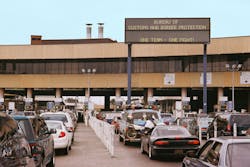With so much uncertainty surrounding the re-negotiations of the North American Free Trade Agreement (NAFTA) and the recent imposition of tariffs by the U.S. on steel and aluminum imports, businesses – included those in freight transportation – need to start preparing for a “series of risks” that could happen regardless of the outcome of current trade issues, according to a new report from KPMG International and Eurasia Group.
"Don't get caught up in the 'black swans' – by definition they are unpredictable and unexpected," stressed Russ Crawford, national leader of NAFTA services for KPMG in Canada. "The announcement last week by U.S. President Donald Trump about tariffs on steel and aluminum is just one example of the stress in the system on trade today. Prioritize scenario planning over horizon scanning; in this topsy-turvy world, it is much better to focus your time and energy on the known unknowns than trying to complete a full set of possible risks."
The new tariffs on imported steel and aluminum products may harm the construction industry, in particular, noted Stephen Sandherr, CEO of the Associated General Contractors of America (AGC) – and construction activity is a major generator of truck freight.
“These new tariffs will cause significant harm to the nation's construction industry [as] the newly-imposed tariffs will lead to increases in what construction firms are forced to pay for the many steel and aluminum products that go into a typical construction project,” he said.
"Firms that are already engaged in fixed-price contracts may be forced to absorb these costs, forcing them to cut back on new investments in equipment and personnel. And the likely trade war these new tariffs prompt will diminish demand for private investment in infrastructure as well as construction demand for manufacturing, shipping and distribution facilities,” Sandherr added.
Bob Costello, chief economist for the American Trucking Associations (ATA), noted in a recent series of industry presentations that “NAFTA is critical to trucking,” with cross-border NAFTA freight representing $6.5 billion in revenues annually for trucking firms, with 31,000 truck driver jobs “completely dependent” on hauling cross-border goods.
“Suffice to say that NAFTA is a really big deal to the trucking industry,” he added.
KPMG’s Crawford suggests companies “stress-test” their three-year business plans to key trade risk scenarios that could occur no matter the outcome of the NAFTA talks. One example of an approach could be to test the impact of:
- A doubling of the operating expenditure to transact across borders, such as: financial hedges, professional fees, regulatory compliance, travel cost and the like.
- A 72-hour outage of a company’s information backbone (website, online gateways, encrypted messaging services and similar). If a major cloud provider went down in an attack, the damages would be an estimated $50 billion to $120 billion, he said
- Zero cross-border travel for one week – no planes, trains or road traffic across international borders.
- A doubling of transport time (and/or cost) to transport goods via sea, air, road, rail.
“While the parties are now in the seventh round of talks, the reality is there's been relatively limited progress on the key remaining contentious issues,” Crawford said. “The negotiating teams were able to close the anti-corruption chapter and some sectoral annexes, the first chapter successfully completed since the fourth round in October [of 2017].”
He added that it also looks like the digital trade, telecommunications, the food safety plan and animal health chapters could be closed in the current talks in Mexico.
“The fact that negotiators have agreed to continue talks is a signal that all sides still want a deal and the U.S. is not planning to send the withdrawal letter at this point,” Crawford stressed. “But given that U.S. trade representative, Robert Lighthizer, remains critical of various proposals including the binding dispute settlement mechanism and Canada's counteroffer to the U.S. auto content proposal, progress on these issues will be difficult.”
ATA’s Costello, who has been attending the NAFTA negotiations, added that with Mexico’s presidential election ahead in July, with U.S. Congressional midterm elections following in November, means the chances of a deal being struck anytime soon are small.
“The odds of a [NAFTA] deal at this point are low – there are a lot of sticking points,” he explained.
One potential tactic Costello highlighted is that the U.S. would announce a pull out this month, thereby starting what he called a six-month NAFTA withdrawal “clock.”
“It would take time to pull out of the negotiations and return to the WTO [world trade organization] and set tariffs," he said. "It could be a possible negotiating tactic, but it’s a big gamble that a [trade] deal could get down in six months.”
